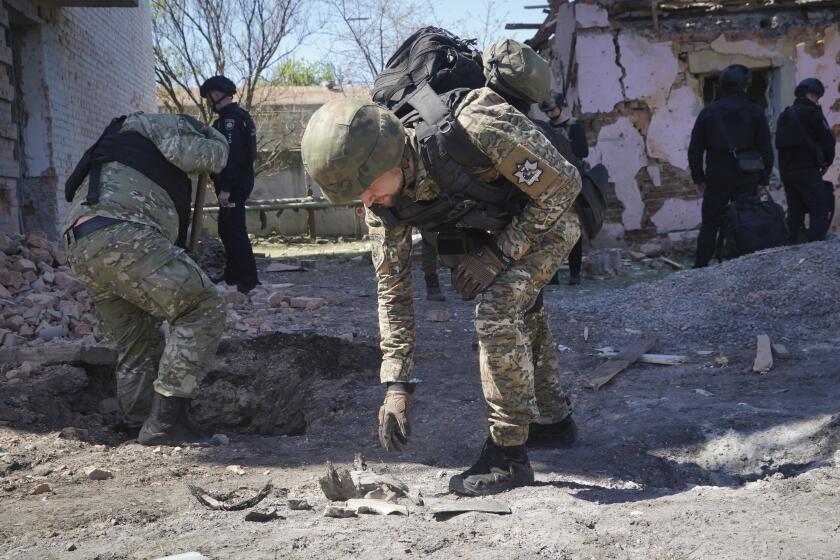Keeping Spirits Up While They Hunker Down
Just as the chaplain Saturday started to lead a group of Marines in song, a Marine sniper on the roof let loose several thunderous rifle blasts at armed insurgents moving into position for a possible attack.
If the Marines in the room below took any notice, they didn’t show it. Instead, they launched into “Lord, we lift your name on high.”
For the young men of Echo Company of the 2nd Battalion, 1st Regiment of the 1st Marine Division, the sound of sniper fire -- or mortar rounds, rockets or bursts from automatic weapons -- is hardly noticeable anymore.
Other companies and other battalions have done their share of fighting in Fallouja, but none have done more than Echo Company of the 2/1.
Hunkered down in several adjoining two-story homes in an abandoned, bullet-ridden neighborhood in the northwestern corner of the city, the Marines of Echo Company have engaged in skirmishes with insurgents nearly every day for three weeks.
And if the order comes for a full-out assault on the city center, there is no doubt that Echo Company will be a major part of the operation.
“This is what Marines do,” said Sgt. Casey Olson, 26, of Fargo, N.D. “They fight.”
They also laugh, grieve and bottle up their emotions to stay focused on the heavily armed insurgents who lie only a few hundred yards away.
Despite a cease-fire agreement and a call for the people of Fallouja to relinquish their heavy weapons, arranged with the help of Iraqi mediators, the troops of Echo Company, and the battalion’s other companies, Fox and Golf, have been attacked daily.
Last week, Echo Company fought a five-hour battle with insurgents, leaving three Marines wounded and scores of insurgents dead or injured.
The notion of a cease-fire has brought a kind of sarcastic battlefield humor.
The insurgents aren’t really firing mortar rounds at the Marines, they’re only trying to turn in their mortars one shell at a time, the troops joke. And those insurgents running between houses with AK-47s and rocket-propelled grenades? They are actually running to a Marine checkpoint to give up their weaponry.
The floors of the homes occupied by Echo Company are a jumble of weapons, sleeping bags, magazines, DVDs, MRE rations, cartridge belts, letters from home.
Concrete walls have been knocked down between rooms and between houses to keep the Marines from having to venture into alleys.
The Marines cordoned off the city five days after four U.S. civilian security contractors were slain and their bodies mutilated.
Marines sleep 10 or more to a room. Snipers are on the roofs, streets are blocked with concertina wire, and houses are barricaded with sandbags. The formerly vibrant, middle-class neighborhood has become a ghost town after residents fled the fighting.
There is no water or electricity; the sewer system has stopped functioning. Resupply convoys arrive under heavy protection. The wind carries dust storms down the streets and the sound and sight of mortar rounds and rockets fill the evening darkness.
The insurgents, several hundred yards away, have been using mosques as rallying spots. The minaret of one mosque offers a direct view of the alley between the homes occupied by the Marines, a perfect vantage point for insurgent snipers.
Two weeks ago, two members of Echo Company were killed and seven wounded during an attack by insurgents. The painful memory lingers.
“It was the worst night of my life,” said Navy medical corpsman Jason Duty, 20, of New London, Conn. “You take classes, symposiums, training on mass casualties, but it slaps you in the face when you see nine guys bleeding, screaming.”
A small memorial with a tiny American flag has been erected for the two Marines killed: Lance Cpl. Robert Zurheide of Tucson and Lance Cpl. Brad Shuder of El Dorado Hills, Calif.
“You just can’t think about it, you can’t,” said Lance Cpl. Christopher Rodriguez, 19, of Des Moines. “You just keep pushing forward.”
Rodriguez says he notices things that lift his spirits when he is on patrol and entering other abandoned houses looking for insurgents.
“You see things -- like baby pictures and a Barbie doll, maybe some toys,” Rodriguez said. “You realize these are people who want a good life. And we can help them have it.”
Lt. Ben Wagner, 27, of San Diego said the Marines of Echo Company have had to build “an emotional wall” to block out things that could distract them.
“It’s not easy or fun. But as platoon commander, if I’m sad or upset, it affects other people,” Wagner said. “The same is true of the other Marines. You have to stay focused on the job, even if it’s hard.”
Two-thirds of the company served in the invasion of Iraq in March 2003 that toppled Saddam Hussein’s regime. Now, its members say, it’s more difficult, more confusing, more tragic.
“It’s worse this time,” said Cpl. Joshua Hill, 22, of Huntsville, Texas. “Last time, we fought the Iraqi army and they surrendered. This time, it’s like we’re fighting the Iraqi people and they don’t understand we’re trying to help them.”
Olson agreed that “they seem more determined this time. We’re going to beat them, but they seem more determined.”
All military groups take on the personality of their commander. For Echo Company, that’s Capt. Douglas Zembiec, 31, of Albuquerque, a balding, gregarious man who, in glasses, looks like a high school science teacher but was a former wrestler at the Naval Academy.
Zembiec believes in leading from the front. He led the charge into hostile fire that started the Marine assault April 6 on the neighborhood and has been known to disregard his own safety to get a clear radio transmission during combat.
His admiration for his troops is hard to contain.
“They’re fired up, they’re motivated,” he said while filling out forms requesting medals for bravery for several of his men. “These are young men who grew up wanting to be defenders.... What other kind of job has this kind of honor and danger?”
Asked what kind of day his Marines are having, Zembiec said, “A terrific day. We just whacked two [insurgents] running down an alley with AK-47s.”
Gunnery Sgt. Daniel Jonas, 35, of San Diego, who served in Operation Desert Storm and Kosovo, said Zembiec’s enthusiasm and his policy of giving authority to enlisted Marines have helped sustain morale.
“This is a very close company,” Jonas said.
There are, inevitably, strong bonds formed from facing danger and from their mutual dependence.
“We’re out here for each other,” said Pfc. Bernard Boykin, 21, of Eugene, Ore. “I wouldn’t want to be anywhere else.”
And what will the men of Echo Company remember when it is over?
“I’ll always remember the good times, the jokes, the stories,” said Lance Cpl. Chris Hankins, 19, of Kansas City, Mo. “But the bad things, the dead bodies, seeing my friends bleeding and being carried away, I hope to forget that.
“I never want to think about that again.”
More to Read
Start your day right
Sign up for Essential California for news, features and recommendations from the L.A. Times and beyond in your inbox six days a week.
You may occasionally receive promotional content from the Los Angeles Times.






